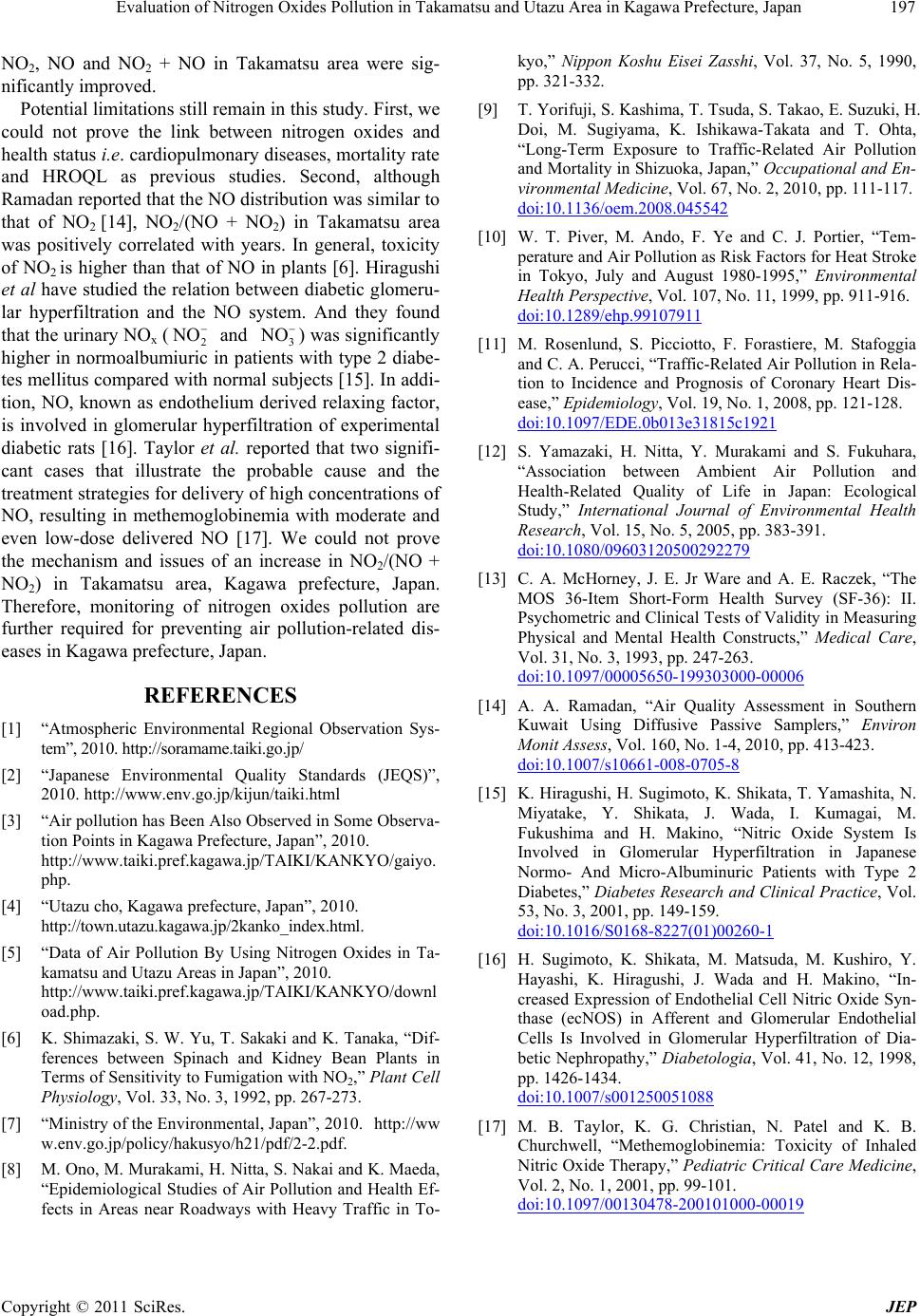
Evaluation of Nitrogen Oxides Pollution in Takamatsu and Utazu Area in Kagawa Prefecture, Japan197
NO2, NO and NO2 + NO in Takamatsu area were sig-
nificantly improved.
Potential limitation s still remain in this study. First, we
could not prove the link between nitrogen oxides and
health status i.e. cardiopulmonary diseases, mortality rate
and HROQL as previous studies. Second, although
Ramadan reported that the NO distribution was similar to
that of NO2 [14], NO2/(NO + NO2) in Takamatsu area
was positively correlated with years. In general, toxicity
of NO2 is higher than that of NO in plants [6]. Hiragushi
et al have studied the relation between diabetic glomeru-
lar hyperfiltration and the NO system. And they found
that the urinary NOx (2 and 3) was significantly
higher in normoalbumiuric in patients with type 2 diabe-
tes mellitus compared with normal subjects [15]. In addi-
tion, NO, known as endothelium derived relaxing factor,
is involved in glomerular hyperfiltration of experimental
diabetic rats [16]. Taylor et al. reported that two signifi-
cant cases that illustrate the probable cause and the
treatment strategies for delivery of high concentrations of
NO, resulting in methemoglobinemia with moderate and
even low-dose delivered NO [17]. We could not prove
the mechanism and issues of an increase in NO2/(NO +
NO2) in Takamatsu area, Kagawa prefecture, Japan.
Therefore, monitoring of nitrogen oxides pollution are
further required for preventing air pollution-related dis-
eases in Kagawa prefecture, Japan.
NONO
REFERENCES
[1] “Atmospheric Environmental Regional Observation Sys-
tem”, 2010. http://soramame.taiki.go.jp/
[2] “Japanese Environmental Quality Standards (JEQS)”,
2010. http://www.env.go.jp/kijun/taiki.html
[3] “Air pollution has Been Also Observed in Some Observa-
tion Points in Kagawa Prefecture, Japan”, 2010.
http://www.taiki.pref.kagawa.jp/TAIKI/KANKYO/gaiyo.
php.
[4] “Utazu cho, Kagawa prefecture, Japan”, 2010.
http://town.utazu.kagawa.jp/2kanko_index.html.
[5] “Data of Air Pollution By Using Nitrogen Oxides in Ta-
kamatsu and Utazu Areas in Japan”, 2010.
http://www.taiki.pref.kagawa.jp/TAIKI/KANKYO/downl
oad.php.
[6] K. Shimazaki, S. W. Yu, T. Sakaki and K. Tanaka, “Dif-
ferences between Spinach and Kidney Bean Plants in
Terms of Sensitivity to Fumigation with NO2,” Plant Cell
Physiology, Vol. 33, No. 3, 1992, pp. 267-273.
[7] “Ministry of the Environmental, Japan”, 2010.http://ww
w.env.go.jp/policy/hakusyo/h21/pdf/2-2.pdf.
[8] M. Ono, M. Murakami, H. Nitta, S. Nakai and K. Maeda,
“Epidemiological Studies of Air Pollution and Health Ef-
fects in Areas near Roadways with Heavy Traffic in To-
kyo,” Nippon Koshu Eisei Zasshi, Vol. 37, No. 5, 1990,
pp. 321-332.
[9] T. Yorifuji, S. Kashima, T. Tsuda, S. Takao, E. Suzuki, H.
Doi, M. Sugiyama, K. Ishikawa-Takata and T. Ohta,
“Long-Term Exposure to Traffic-Related Air Pollution
and Mortality in Shizuoka, Japan,” Occupational and En-
vironmental Medicine, Vol. 67, No. 2, 2010, pp. 111-117.
doi:10.1136/oem.2008.045542
[10] W. T. Piver, M. Ando, F. Ye and C. J. Portier, “Tem-
perature and Air Pollution as Risk Factors for Heat Stroke
in Tokyo, July and August 1980-1995,” Environmental
Health Perspective, Vol. 107, No. 11, 1999, pp. 911-916.
doi:10.1289/ehp.99107911
[11] M. Rosenlund, S. Picciotto, F. Forastiere, M. Stafoggia
and C. A. Perucci, “Traffic-Related Air Pollution in Rela-
tion to Incidence and Prognosis of Coronary Heart Dis-
ease,” Epidemiology, Vol. 19, No. 1, 2008, pp. 121-128.
doi:10.1097/EDE.0b013e31815c1921
[12] S. Yamazaki, H. Nitta, Y. Murakami and S. Fukuhara,
“Association between Ambient Air Pollution and
Health-Related Quality of Life in Japan: Ecological
Study,” International Journal of Environmental Health
Research, Vol. 15, No. 5, 2005, pp. 383-391.
doi:10.1080/09603120500292279
[13] C. A. McHorney, J. E. Jr Ware and A. E. Raczek, “The
MOS 36-Item Short-Form Health Survey (SF-36): II.
Psychometric and Clinical Tests of Validity in Measuring
Physical and Mental Health Constructs,” Medical Care,
Vol. 31, No. 3, 1993, pp. 247-263.
doi:10.1097/00005650-199303000-00006
[14] A. A. Ramadan, “Air Quality Assessment in Southern
Kuwait Using Diffusive Passive Samplers,” Environ
Monit Assess, Vol. 160, No. 1-4, 2010, pp. 413-423.
doi:10.1007/s10661-008-0705-8
[15] K. Hiragushi, H. Sugimoto, K. Shikata, T. Yamashita, N.
Miyatake, Y. Shikata, J. Wada, I. Kumagai, M.
Fukushima and H. Makino, “Nitric Oxide System Is
Involved in Glomerular Hyperfiltration in Japanese
Normo- And Micro-Albuminuric Patients with Type 2
Diabetes,” Diabetes Research and Clinical Practice, Vol.
53, No. 3, 2001, pp. 149-159.
doi:10.1016/S0168-8227(01)00260-1
[16] H. Sugimoto, K. Shikata, M. Matsuda, M. Kushiro, Y.
Hayashi, K. Hiragushi, J. Wada and H. Makino, “In-
creased Expression of Endothelial Cell Nitric Oxide Syn-
thase (ecNOS) in Afferent and Glomerular Endothelial
Cells Is Involved in Glomerular Hyperfiltration of Dia-
betic Nephropathy,” Diabetologia, Vol. 41, No. 12, 1998,
pp. 1426-1434.
doi:10.1007/s001250051088
[17] M. B. Taylor, K. G. Christian, N. Patel and K. B.
Churchwell, “Methemoglobinemia: Toxicity of Inhaled
Nitric Oxide Therapy,” Pediatric Critical Care Medicine,
Vol. 2, No. 1, 2001, pp. 99-101.
doi:10.1097/00130478-200101000-00019
Copyright © 2011 SciRes. JEP